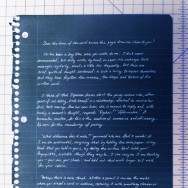Does the trace of the word across the page draw me closer to you?
2011
Archival inkjet print
13in x 18.5in
Text reads:
It has been a long time since you wrote to me. I don’t mean communicated, but really wrote, by hand, on paper. We exchange text messages regularly, emails a little less frequently. But these are brief spurts of thought condensed: in such a hurry to explain themselves that they have forgotten the romance, the shape and texture of the written word.
I think of that Japanese drama about the young woman who, after years of not dating finds herself in a relationship. Excited to receive her first text message from her new lover, she is anxious to reply and, with barely a moment’s thought, responds ‘ryokai!’ ‘Affirmative!’ A businesslike reaction, for this is the medium of commerce and efficiency. No room for the meanderings of poetry.
‘What difference does it make?’ you would ask me. And I wonder if I am too sentimental, imagining that by holding the same paper in my hand that you held in yours, by feeling the surface that holds your fingerprints, invisible though they may be, I can imagine I am touching you – your skin, your cheek – and hold out that much longer as I wait for your return.
Perhaps there is more, though. Written in pencil, I can see the marks where you erased a word or sentence, replacing it with something cleaner or clearer. Written in pen, your writing becomes a stream of consciousness as you must commit yourself to each word that goes on the page, and accept the mistakes as part of the process. In this way I can see the shape of your thoughts as if I were speaking to you, remember your linguistic quirks, feel the weight of your concerns through your struggles on the page. Turned into an email, this writing and rewriting becomes invisible, all thoughts are given equal weight, and I feel as if you wear a translucent mask so that I see the general form of your features but their unique details are blurred to unrecognisability.
‘Bullshit,’ you would reply. ‘The signs are still there as long as you are sensitive enough to learn them.’ You point to the rhythms of message and reply as indicative of the speed of your thoughts, the emoji and acronyms as signs of your passion. ‘How can you, who advocate for the poetics of grafitti tags, fail to recognize the value of these symbols, the expressive potential of this burgeoning language?’
‘Grafitti is still written by hand, bearing the undeniable mark of its maker’ I reply, tritely. ‘Electronic communication is made in uniform letters that reveal nothing of the writer. I cannot even be sure it was you who sent it to me.’
‘If you cannot recognize the thoughts that are mine, how do you expect to recognize mere handwriting?’ you would counter. ‘All have the potential to be faked, but if you truly know the writer, you can recognize his content.’
But I don’t want my exchanges with you to become mere content. I want something more expressive, more meaningful. Again, I feel that form has become the slave of content, condensing our thoughts in the name of efficiency, economy. Our reality, our emotions and our imaginations are all much messier, nuanced and unpredictable. How can this come through in 140 characters, in rushed replies from the office or notes typed letter by letter onto tiny cell phone keypads while exchanging trains? Sent by virtual networks to copper wires to phones and computers, there is little risk and no effort necessary. No stamps, no trip to the post office or home. No time or thought for the paper, the envelope, the aesthetic of the letter. Can it be possible to reclaim the spirit of our thoughts in this cold, impersonal medium?
